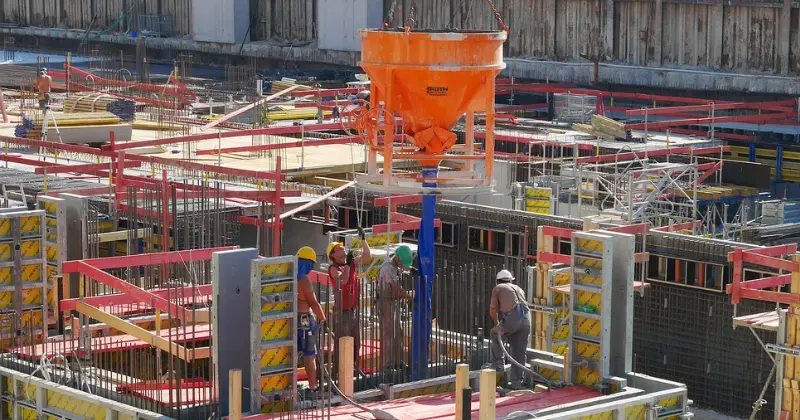11 mins read
Reviewing the Top 16 Construction Certifications

Construction certifications are certainly not mandatory, but dozens of programs are available to help you improve your knowledge or get advanced training in areas that interest you. Many of these certifications can be obtained relatively quickly and for a minimal cost. Considering that, it is worth looking at some of the most popular and beneficial certification options.
In this blog post, we review the top construction certificates in management, safety, sustainability, and other important areas. We hope our research and insight help you determine which of these certificate programs can take your career to the next level.
Top 16 Construction Certifications
Millions of construction jobs are available that require no formal education or certification, while others call for a higher level of knowledge and expertise that can be achieved through construction certifications. Regardless of your current role or aspirations, these valuable courses can quickly and conveniently teach new skills and enhance client confidence in your abilities.
This useful construction certifications list includes options for specialized training to enhance your current job or prepare you for the next chapter of your career. As new specialties emerge and digital technology continues to transform the industry, these certificates can also be the key to increased pay and responsibility.
Management:
1. Project Management Professional (PMP)
Project management is one of the most valuable and in-demand skills in the industry, and the Project Management Institute (PMI) offers a construction certificate for this discipline that is recognized and respected internationally.
The PMP course focuses on skills like team building, ethics, and project execution that bring real-world value. This certification is recommended for those with a few years of industry experience. After completing the coursework and passing the PMP exam, the certification remains valid for three years.
2. Certified Construction Manager (CCM)
Offered by the Construction Management Association of America, CCM certification is considered the “gold standard” of construction management certifications, since it allows participants to gain a much deeper understanding of industry practices, including design, planning, and other important knowledge areas. Those without a bachelor’s degree can still be certified if they have at least eight years of previous construction industry experience.
3. Certified Professional Constructor (CPC)
A CPC certificate is an additional option that conveys a broad range of knowledge and skills in many different facets of management and operations. Offered exclusively by the American Institute of Constructors (AIC), this program requires separate certification and exam fees but can be completed entirely online. CPC certification is valid for two years after obtaining a passing score on the exam.
Safety:
4. OSHA
The Occupational Safety and Health Administration (OSHA) is recognized as a worldwide leader in job site safety. It provides valuable training programs for workers and managers that emphasize the importance of construction site safety precautions, personal protective equipment (PPE), and hazard identification.
OSHA was established to enforce workplace standards and reduce accidents in construction and many other industries. After completing a 10- or 30-hour safety training course, participants receive official ID cards that many employers now require for all workers.
5. Construction Skills Certification Scheme (CSCS)
One of the most popular and widely recognized construction safety certifications in the UK is the CSCS card program. Through this training program, workers are qualified to perform various labor intensive and potentially dangerous tasks. Much like OSHA, CSCS training does not include a formal exam, but course completion cards are now required by many employers in the UK as they seek to improve their workplace safety standards.
6. NASP
The National Association of Safety Professionals (NASP) is an additional certification process created to promote safe jobsite practices. This program is ideal for clients, general contractors, and construction project managers, since the content is more in-depth than standard OSHA or CSCS training. NASP is a non-profit organization that was established to provide specialized safety training for construction, as well as petroleum, mining, and other safety-conscious industries. Two unique classes of professional certification can be attained.
Construction Technology:
7. Construction Software
As technology continues to be one of the main drivers of efficiency and profitability in the construction industry, software skills and certifications can provide a professional with a big competitive advantage when applying to a job. As a renowned and experienced provider of some of the most valuable software solutions in the construction market, RIB Software training resources offers a range of valuable courses and educational instances to become an expert in our solutions. Some of the courses come with an official certificate to prove the skills of the user.
RIB also offers student resources and training for RIB CostX, RIB Candy and RIB SpecLink, with free licenses to help shape the next generation of construction professionals who will enter the job market with key software knowledge.
8. BIM Certification
Building Information Modeling (BIM) is quickly moving construction design and verification processes into the digital realm. Many private companies and government agencies sponsor certification programs for BIM users and specialists. The BuildingSMART BIM Certification program is one of the most popular and respected options, responsible for qualifying over 20,000 individuals in more than 25 countries. This certification process has opened exciting career opportunities in digital construction for many of its participants.
9. CCIFP
The unique and complex financial aspects of the construction industry also call for advanced training and certification to demonstrate the appropriate level of knowledge. The Certified Construction Industry Financial Professional (CCIFP) program was created for this purpose, with course work covering accounting, risk management, and tax preparation, along with the use of advanced software tools that help to streamline and integrate these tasks. CCIFP certification also emphasizes leadership and client relationship skills.
Sustainability:
10. LEED
The Leadership in Energy and Environmental Design (LEED) certification program provides a valuable framework to assess sustainability metrics in buildings and other structures. LEED certification also applies to individuals, with courses designed to train building owners, designers, construction architects, and other stakeholders on the latest policies and practices used to rank and assess sustainable buildings. The exam for Green Associates takes two hours to complete, and certifications are valid for two years.
11. BREEAM
Building Research Establishment Environmental Assessment Methods (BREEAM) is an international standard used to grade the sustainability of commercial, office, and residential buildings. Like LEED, this organization also offers courses on green building practices and sustainable construction through their BRE Academy. The options range from introductory classes to advanced certification programs for BREEAM assessors.
12. CEM
The US Association of Energy Engineers (AEE) has established a new category of construction certificates in sustainability, designed to help course participants implement energy conservation strategies, monitor sustainability metrics, and develop new green building tools and processes.
The Certified Energy Manager (CEM) designation is the highest level of certification currently available through AEE. Unlike many other entries on our construction certifications list, CEM training is only available to construction professionals with a bachelor’s degree in a technical discipline.
Construction Specialties:
13. Crane Operation
Heavy equipment operation is a demanding and potentially hazardous occupation that requires high skill and confidence. While on-the-job training is an option for many aspiring operators, construction certificates are also available to cover many of these specialties.
One example of this is the Crane Operator Certification program sponsored by the National Commission for the Certification of Crane Operators (NCCCO) in the US. This nonprofit organization offers valuable training and exams covering many common types of cranes, emphasizing jobsite and operator safety.
14. ACI Concrete Certification
Concrete mixing is both an art and a science, and many countries have construction certifications dedicated to these practices. In the US, the American Concrete Institute (ACI) provides internationally recognized certification courses and exams.
Similar courses and certification programs can be found around the world. For example, the Concrete Society in the UK offers certificates in ready-mixed concrete technology and advanced concrete courses for project managers and supervisors. Specialists in this field are discovering that certification is often required for new government infrastructure contracts.
15. Aerial Lift Training
Much like cranes, aerial lifts are commonly found on construction sites, and can become the source of dangerous falls and other accidents when used incorrectly. This safety gap prompted OSHA to sponsor their own specialized aerial lift training and certification program for a minimal fee.
Although the training can be completed online from anywhere in the world, it features live instructor-led sessions that cover safe aerial and scissor lift operation in detail. This certification is recommended (and often mandatory) for anyone looking to operate this type of equipment.
16. Certified Demolition Supervisor (CDS)
What goes up must eventually come down, and certification as a demolition supervisor ensures you are performing these important tasks safely and efficiently. The course covers the operational methodology of demolition in detail, as well as the environmental, safety, and project management skills needed to support the overall process. The well-rounded curriculum also includes fall protection and asbestos awareness training, along with basic first aid & CPR.
Conclusion
Construction certifications are a relatively easy way to improve your knowledge and confidence while demonstrating the commitment to safety, sustainability, and efficiency that employers and clients are looking for.
RIB Software allows professionals in every specialty area and country to channel their advanced knowledge and experience with invaluable training resources for our toolkit of solutions for planning, estimating, scheduling, takeoff, procurement, collaboration, document management, and much more.
If you are new to RIB Software and are interested in seeing what our solutions are all about, get your free demo for RIB’s toolkit today!
Most Recent
11 mins read
10 mins read
10 mins read
29 mins read
Blog Categories

Ebook











